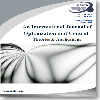Model predictive control-based scheduler for repetitive discrete event systems with capacity constraints
Model predictive control-based scheduler for repetitive discrete event systems with capacity constraints
___
- [1] Garcia, C.E., Prett, D.M., and Morari, M., Model predictive control: theory and practice - a Survey. Automatica, 25 (3), 335-348 (1989).
- [2] Wang, L., Model Predictive Control System Design and Implementation Using MATLAB®. Springer, New York (2009).
- [3] Cassandras, C.G. and Lafortune, S., Introduction to Discrete Event Systems. Springer, New York (2010).
- [4] Hrz, B. and Zhou, M., Modeling and Control of Discrete-event Dynamic Systems: with Petri Nets and Other Tools. Springer, London (2007).
- [5] Amari, S., Demongodin, I., Loiseau, J.J., and Martinez, C., Max-plus control design for temporal constraints meeting in timed event graphs. IEEE Transactions on Automatic Control, 57 (2), 462-467, 2011.
- [6] De Schutter, B., and Van den Boom, T.J.J., Model predictive control for max-plus-linear discrete event systems. Automatica, 37 (7), 1049-1056 (2001).
- [7] Goto, H., Masuda, S., Takeyasu, K., and Amemiya, T., Derivation algorithm of statespace equation for production systems based on max-plus algebra. Industrial Engineering and Management Systems, 3 (1), 1-11 (2004).
- [8] Baccelli, F., Cohen, G., Olsder, G.J., and Quadrat, J.P., Synchronization and Linearity. An Algebra for Discrete Event Systems. Wiley, New York (1992) Available from: http://maxplus.org
- [9] Heidergott, B., Olsder, G.J., and Woude, L., Max Plus at Work. Modeling and Analysis of Synchronized Systems. Princeton University Press, New Jersey (2006).
- [10] Imaev, A. and Judd, R.P., Block diagrambased modeling of manufacturing systems using max-plus algebra. Proceedings of the American Control Conference, 4711-4716 (2009).
- [11] Goverde, R.M.P, A delay propagation algorithm for large-scale railway traffic networks. Transportation Research Part C, 18 (3), 269-287 (2010).
- [12] Akian, M., Gaubert, S., and Lakhoua, A., Convergence analysis of the max-plus finite element method for solving deterministic optimal control problems. Proceedings of the 47th IEEE Conference on Decision and Control, 927-934 (2008).
- [13] Maia, C.A., Andrade, C.R., and Hardouin, L., On the control of max-plus linear system subject to state restriction. Automatica, 47 (5), 988-992 (2011 ). [14] Amari, S., Demongodin, I., Loiseau J.J., and Martinez, C., Max-plus control design for temporal constraints meeting in timed event graphs. IEEE Transactions on Automatic Control, 57 (2), 462-467(2012)
- [15] Houssin, L., Lahaye, S., and Boimond, J.L., Control of (max, +)-linear systems minimizing delays, Discrete Event Dynamic Systems, 2012, DOI: 10.1007/s10626-012- 0143-1
- [16] Declerck, P. and Guezzi, A., Predictive control of timed event graphs with specifications defined by P-time event graphs, Discrete Event Dynamic Systems, 2012, DOI: 10.1007/s10626-012-0150-2
- [17] Van den Boom, T.J.J. and De Schutter, B., Model predictive control for perturbed maxplus-linear systems: a stochastic approach. International Journal of Con trol, 77 (3), 302-309 (2004).
- [18] Necoara, I., Van den Boom, T.J.J., and De Schutter, B., Hellendoorn, H., Stabilization of max-plus-linear systems using model predictive control: the unconstrained case, Automatica, 44 (4), 971-981, (2008).
- [19] Goto, H. and Takahashi, H., Efficient representation of the state equation in maxplus linear systems with interval constrained parameters. IEICE Transactions on Fundamentals of Electronics, Communications and Computer Sciences, E95-A (2), 608-612 (2012).
- [20] Goto, H., Dual representation and its online scheduling method for event-varying DESs with capacity constraints. International Journal of Control, 81 (4), 651-660 (2008).
- [21] Goto, H., A lightweight model predictive controller for repetitive discrete event systems, Asian Journal of Control, 2013 (in press)
- [22] Nocedal, J. and Wright, S., Numerical Optimization Second Edition. Springer, New York (1999).
- [23] Hillier, F. S. and Lieberman, G. J., Introduction to Operations Research. McGraw Hill, New York (2004)
- ISSN: 2146-0957
- Yayın Aralığı: 4
- Yayıncı: Prof. Dr. Ramazan YAMAN
Claudia KRATZENSTEİN, Thomas SLAWİG
Modification of the Armijo line search to satisfy the convergence properties of HS method
Mohammed BELLOUFİ, Rachid BENZİNE, Yamina LASKRİ
Minimization over randomly selected lines
Abay Molla KASSA, Semu Mitiku KASSA
Air fuel ratio detector corrector for combustion engines using adaptive neuro-fuzzy networks
Control of a hydraulic system by means of a fuzzy approach
Mohamed KSANTİNİ, Ameni ELLOUZE, Francois DELMOTTE
The system optimization perspective for multiproduct supply chain network
Mina Saee BOSTANABAD, Javad MEHRİ-TEKMEH, Mirkamal MİRNİA, Ali Moghanni DEHKHARGHANİ
